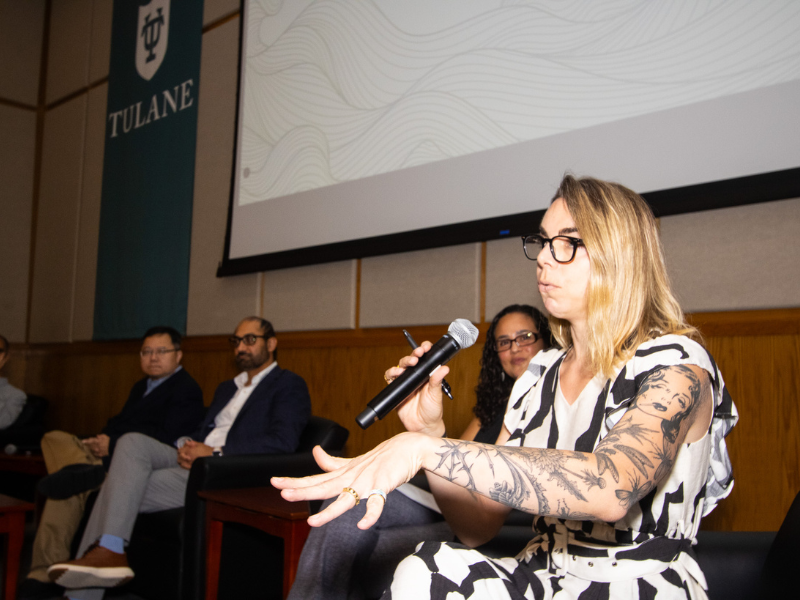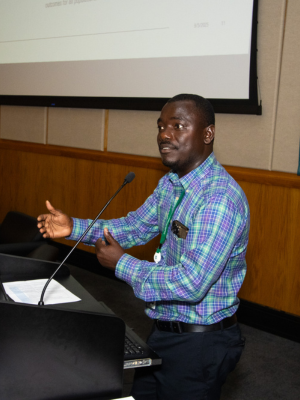Demystifying AI in Public Health
Generative artificial intelligence is changing the way many professions approach and implement their work. Public health is no exception.
On September 5, the Celia Scott Weatherhead School of Public Health and Tropical Medicine held a day-long research symposium on Demystifying AI in Public Health. The event, part of Dean Thomas LaVeist’s strategic initiative on Artificial Intelligence and Data Science, showcased current research in this area, highlighting how machine learning, natural language processing, and predictive analytics can address critical public health challenges. Panel and audience discussions examined the practical and ethical implications of deploying these tools.
Dr. Samuel Kakraba, assistant professor of biostatistics and data science, and Dr. Patrick Button, executive director of Tulane’s Connolly Alexander Institute for Data Science (CAIDS), set the stage for the symposium by providing an overview about AI and machine learning in public health and highlighting some of Tulane’s current and future initiatives in artificial intelligence.
During both morning and afternoon panel presentations by guest speakers and Tulane faculty, attendees learned how their peers are advancing their work with AI. Dr. Hua Xu from the Yale School of Medicine and Harvard’s Dr. Jagpreet Chhatwal shared how they have been able to accelerate connections among published studies and synthesize evidence across public health data. Alumna Dr. Simone Skeen (SBPS PhD ’25), now a post-doctoral fellow at Brown university’s Warren Alpert Medical School, is studying an evidence-based chatbot for mindfulness. Dr. Lizheng Shi, Vanselow Chair in Health Management and Policy, is using modern risk engines and machine learning to predict diabetes complications. Dr. Tom Carton (GCHB PhD ’13) showed how the Louisiana Public Health Institute is using machine learning with electronic health records to identify and track long COVID. Other speakers covered the use of big data for public health decision-making, machine learning workflows, and the uses of machine learning for social media listening.
The symposium’s interactive format encouraged broad participation across formal sessions and in informal networking. Audience questions prompted constructive conversations about responsible AI—recognizing that model quality depends on training data while tools are rapidly improving. Panelists highlighted practical steps to reduce bias and misinformation, emphasized ethical safeguards (including care for people at risk of self-harm), and trust-building as clinical use expands, and noted energy demands alongside the optimism of Dr. Aron Culotta, with the Tulane’s Center for Community-Engaged AI, who expressed confidence that the computer science community will continue to improve efficiency and lessen environmental impacts.
As attendees enjoyed lunch, nearly 20 students shared posters highlighting the ways they are using AI in their own research. It was clear that students, having grown up in a tech-forward world, were well prepared to use tools in innovative ways that could improve health efficiency and find better solutions.
The symposium concluded with a discussion on innovation and funding, featuring Tobin Lasson, chief bundle solutions officer at Cedar Gate Technologies and a member of the Dean’s Advisory Council; Dr. Kimberly Gramm, chief innovation and entrepreneurship officer at the Tulane Innovation Institute; and the return of CAIDS’ Dr. Patrick Button. Together, this group talked about how to drive innovation in public health and how funders choose, shape, and sustain AI projects.
The event was organized by the Dean’s Office, Kakraba, and Dr. Paul Hutchinson, professor of International Health and Sustainable Development and the lead for the AI and Data Science strategic initiative. By day’s end, the event had catalyzed new connections and a shared commitment to responsible, evidence-driven innovation, and the school will carry this momentum forward through monthly seminars and cross-disciplinary collaborations throughout the year.



